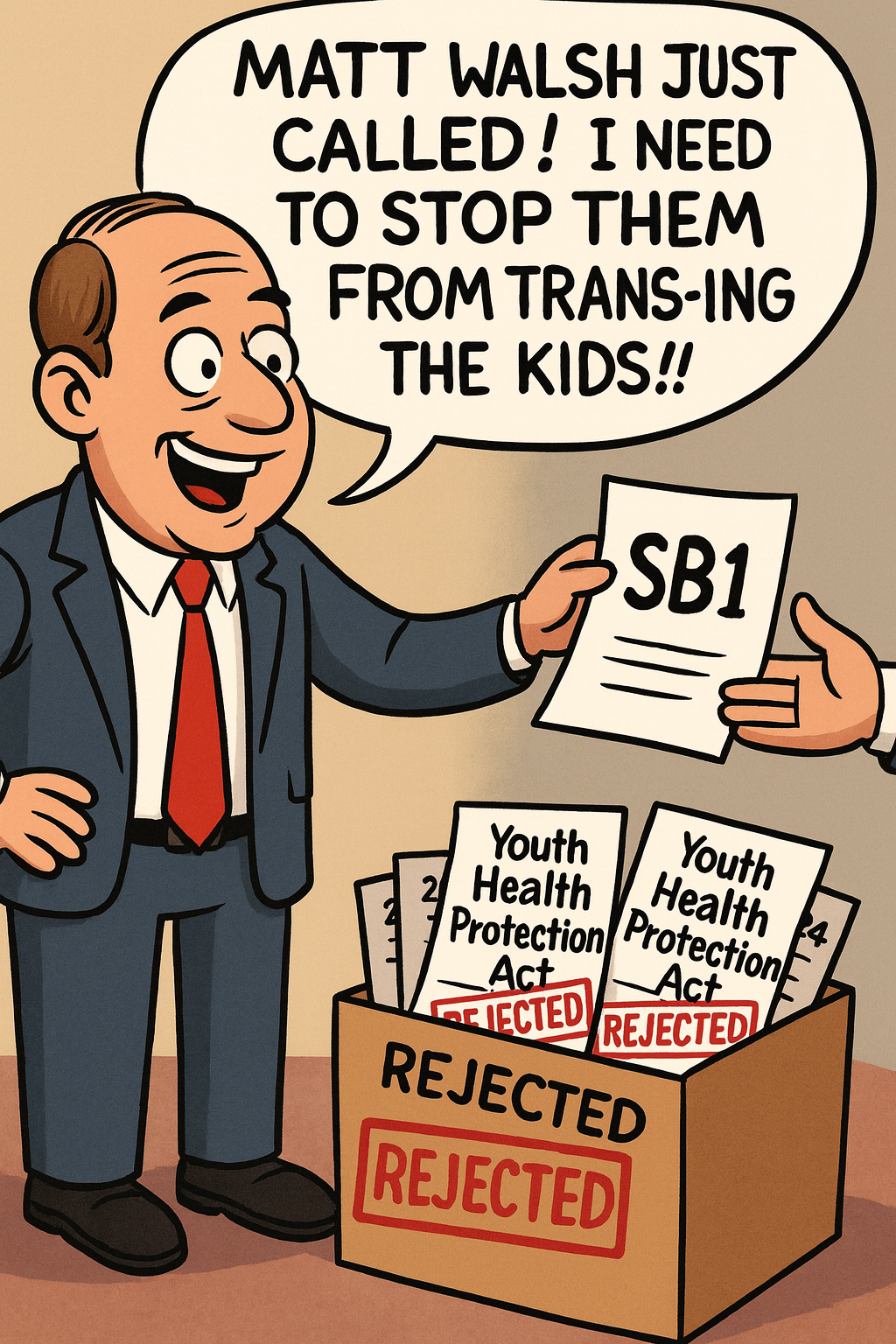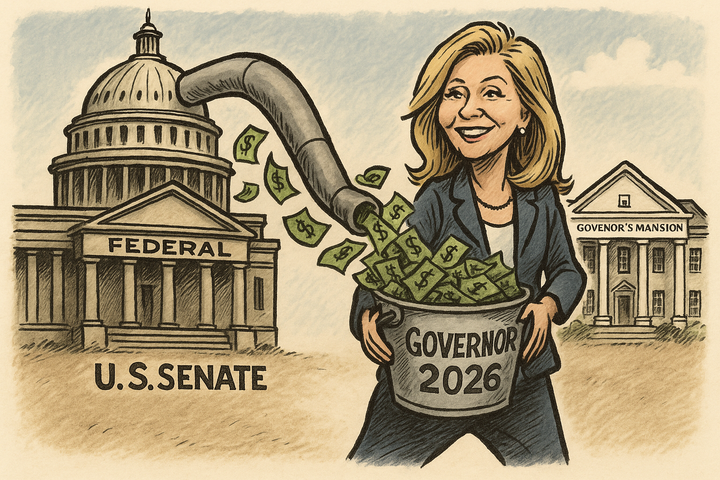Jack Johnson’s award for “protecting kids” celebrates a law he carried only after it became politically safe—years after Janice Bowling fought for the same protections without help from the leadership now taking credit.
When Do No Harm, the self-described “anti-woke” physician advocacy group, announced that Tennessee Senate Majority Leader Jack Johnson had been named its “Legislator of the Year,” the recognition landed like a neatly staged photo-op: a smiling incumbent, a conservative doctors’ group, and a narrative of moral victory. Johnson, they said, had worked “tirelessly” to combat diversity, equity, and inclusion in higher education and government while protecting Tennessee children from “gender-affirming” medical procedures. It was a flattering story—and a politically convenient one. But the history behind it tells something closer to the opposite: a tale not of leadership but of timing.
The bill that earned Johnson his award, Senate Bill 1, prohibits gender-related medical procedures for minors in Tennessee. It was signed into law in 2023 and later upheld by the U.S. Supreme Court, which described the state’s authority to regulate medical care for children as “well within constitutional bounds.” But long before SB1, nearly identical legislation had already been written, introduced, and ignored—by Senator Janice Bowling of Tullahoma. Beginning in 2020, Bowling filed four consecutive versions of what she called the Youth Health Protection Act, each one designed to stop hospitals and clinics from performing or facilitating hormonal or surgical sex-change treatments on minors. Each year the measure stalled quietly in committee. Each year the Senate leadership, headed by Johnson, looked the other way.
The pattern was striking. Vanderbilt University Medical Center had launched its pediatric transgender clinic in 2019, openly advertising procedures for minors and publishing videos describing them. By the following year, Bowling’s bill was ready to halt it. Johnson—by then the Senate Majority Leader with the authority to shepherd or shelve almost any bill—chose to do neither. The issue, at that time, was controversial. Major hospitals, the Tennessee Medical Association, and a web of corporate donors were publicly aligned with what they called “gender-affirming care.” Opposing it was a risk few in leadership were eager to take.
When the political climate shifted, so did the courage. By 2023, national outrage over pediatric surgeries had made “protecting kids” a safe—and popular—conservative position. Fox News segments, congressional hearings, and conservative commentators such as Matt Walsh had turned what was once a niche debate into a defining cultural line. In that same year, Donald Trump had re-entered the presidential race, and the Republican base was demanding clear moral distinctions between populists and establishment figures. For Johnson—who would soon face another primary challenge from Gary Humble, executive director of Tennessee Stands and the driving force behind the state’s most organized populist conservative movement—this issue was no longer radioactive. In 2022, Humble had come within just 800 votes of unseating him out of nearly 50,000 cast, a margin that included roughly 2,400 Democrats who crossed over to vote in the Republican primary. What had once been a political risk was now electoral gold.
So Johnson sponsored SB1. The bill sailed through a Republican supermajority that had repeatedly let Bowling’s versions die. The cameras were rolling this time, and the political calculus had changed. A measure once treated as a liability became a campaign credential.
Johnson has offered a different explanation for the years of delay. He points to Arkansas’s SAFE Act (Act 626), the first law in the nation to ban such treatments for minors, which passed in 2021 and was quickly challenged in federal court. The Majority Leader has suggested Tennessee needed to see how that case played out before moving forward. It’s a convenient defense—but it falls apart on inspection.
The Arkansas litigation never made the practice of restricting gender medicine unconstitutional; it questioned only how narrowly such restrictions were written. While the lawsuit wound through the courts, Alabama, Mississippi, Florida, Oklahoma, and more than a dozen other states enacted similar laws, most of them modeled directly on Arkansas’s language. None waited for a final ruling. Tennessee could have done the same, adjusting its legal definitions or evidentiary standards. It chose not to. Waiting for precedent was not the reason. The reason was political safety.
That explanation also rings hollow when you look at Tennessee’s record. The legislature has shown flashes of defiance when it was safe to do so, but it has rarely followed through when real pressure arrived. Lawmakers passed a “trigger” abortion ban before Roe v. Wade was overturned, but began carving exceptions into it almost immediately after the decision came down. They passed a law restricting drag performances in public but failed to advance a companion bill that would have applied the same zoning restrictions across all venues—effectively neutralizing the measure’s impact. Tennessee’s leaders have learned how to posture for headlines without upsetting the donor class. When the controversy touches hospitals, corporate medicine, or pharmaceutical money, their sudden caution isn’t prudence. It’s protection.
By 2023, acting was no longer dangerous. The Supreme Court’s later decision in United States v. Skrmetti simply confirmed what Bowling’s drafts had already anticipated: that states have the authority to restrict medical procedures for minors. The law had not changed; the optics had. The political benefit of carrying SB1 during a presidential cycle, especially with Trump leading the national ticket, was far greater than any check written at a fundraiser by Big Medical. As one longtime observer put it, “The cameras made it safe.”
The same pattern defines Johnson’s supposed “tireless fight” against DEI—the other reason cited for his award. While Do No Harm credits him with leading the charge to roll back diversity and equity programs in higher education and state government, none of his bills dismantled the infrastructure that funds or enforces those programs. They were mostly prohibitive statements—restraining future initiatives rather than defunding existing offices. In effect, they re-branded the status quo. More telling is what didn’t happen: between 2021 and 2024, while the Biden administration was embedding DEI mandates into nearly every federal grant program, Tennessee’s majority leader offered no major legislation to resist them. Only after public sentiment turned against DEI in universities did those bills appear.
The broader pattern is unmistakable. When an issue is politically costly, it languishes. When it becomes politically profitable, it becomes a cause. The same leadership that ignored Bowling’s bills in 2020 and 2021 embraced Johnson’s nearly identical bill in 2023—not because the facts had changed, but because the polling had. The fight for Tennessee’s children didn’t suddenly become righteous; it finally became safe.
Meanwhile, the legislator who had carried the fight when it wasn’t—Janice Bowling—received no national award, no glowing headline, and no photo-op with an advocacy group. Her work provided the foundation for SB1, but her name rarely appears in the stories celebrating it. For those watching Nashville’s politics closely, the irony is difficult to miss. A law born of persistence and conviction has been recast as the triumph of a man who found his courage only when it carried no risk.
The Do No Harm award, then, is less a recognition of leadership than a symbol of how politics rewards timing over principle. It honors the legislator who joined the battle after it was already won and whose “tireless” efforts began the moment they could be televised. There is a word for that kind of achievement. In the military it’s called stolen valor.
In politics, it’s just called election season.
If you support what we do, please consider donating a gift in order to sustain free, independent, and TRULY CONSERVATIVE media that is focused on Middle Tennessee and BEYOND!
COME TO OUR EVENT FOR A GREAT EVENING OF BBQ AND GRASSROOTS PATRIOTISM!! SCAN THE QR CODE, OR CLICK HERE!!






Comments ()